- Home
- Kim Newman
Anno Dracula--One Thousand Monsters
Anno Dracula--One Thousand Monsters Read online
CONTENTS
Cover
Also by Kim Newman and Available from Titan Books
Title Page
Copyright
Dedication
1
2: Before Dracula
3: Yōkai Town, December 7, 1899
4: A Knight Templar I
5: Yōkai Town, December 9, 1899
6: Before Dracula (Continued)
7: Yōkai Town, December 10, 1899
8: A Knight Templar II
9: Yōkai Town, December 11, 1899
10: Before Dracula (Continued)
11: Yōkai Town, December 15, 1899
12: A Knight Templar III
13: Yōkai Town, December 16, 1899
14: Before Dracula (Continued)
15: Yōkai Town, December 19, 1899
16: Yōkai Town, December 20, 1899
17: Yōkai Town, December 21, 1899
18: Before Dracula (Concluded)
19: Yōkai Town, December 22, 1899
20: Yōkai Town, December 22, 1899 (Continued)
21: Yōkai Town, December 22, 1899 (Continued)
22: Yōkai Town, December 22, 1899 (Continued)
23: A Knight Templar IV
24: Yōkai Town, December 22, 1899 (Continued)
25: Yōkai Town, December 22, 1899
26: Yōkai Town, December 22, 1899 (Continued)
27: A Knight Templar V
28: Yōkai Town, December 22, 1899 (Continued)
29: Yōkai Town, December 22, 1899 (Continued)
30: At Sea, January 1, 1900
About the Author
Also Available from Titan Books
ANNO DRACULA 1899
ONE THOUSAND MONSTERS
ALSO BY KIM NEWMAN AND AVAILABLE FROM TITAN BOOKS
ANNO DRACULA
ANNO DRACULA: THE BLOODY RED BARON
ANNO DRACULA: DRACULA CHA CHA CHA
ANNO DRACULA: JOHNNY ALUCARD
ANGELS OF MUSIC
THE SECRETS OF DREARCLIFF GRANGE SCHOOL
AN ENGLISH GHOST STORY
PROFESSOR MORIARTY: THE HOUND OF THE D’URBERVILLES
JAGO
THE QUORUM
LIFE’S LOTTERY
BAD DREAMS
THE NIGHT MAYOR
THE MAN FROM THE DIOGENES CLUB (DECEMBER 2017)
VIDEO DUNGEON
1899
ONE THOUSAND MONSTERS
KIM NEWMAN
TITAN BOOKS
Anno Dracula: One Thousand Monsters
Print edition ISBN: 9781781165638
E-book edition ISBN: 9781781165645
Published by Titan Books
A division of Titan Publishing Group Ltd
144 Southwark Street, London SE1 0UP
First edition: October 2017
1 3 5 7 9 10 8 6 4 2
This is a work of fiction. Names, characters, places, and incidents either are the product of the author’s imagination or are used fictitiously, and any resemblance to actual persons, living or dead, business establishments, events, or locales is entirely coincidental. The publisher does not have any control over and does not assume any responsibility for author or third-party websites or their content.
Kim Newman asserts the moral right to be identified as the author of this work.
Copyright © 2017 Kim Newman
No part of this publication may be reproduced, stored in a retrieval system, or transmitted, in any form or by any means without the prior written permission of the publisher, nor be otherwise circulated in any form of binding or cover other than that in which it is published and without a similar condition being imposed on the subsequent purchaser.
A CIP catalogue record for this title is available from the British Library.
What did you think of this book? We love to hear from our readers. Please email us at: [email protected], or write to us at the above address.
To receive advance information, news, competitions, and exclusive Titan offers online, please register as a member by clicking the ‘sign up’ button on our website
www.titanbooks.com
For Cath
Yoru bakari
Miru mono nari to
Omou-nayo!
Hiru sae yume no
Ukiyo nari-keri.
Think not that dreams
appear to the dreamer
only at night:
The dream of this world of pain
appears to us
even by day.
Lafcadio Hearn,
In Ghostly Japan
‘Immortal powers!’ cried Roderick, ‘what a vision! In the name of transcendent perfection, who is she?’ He sprang up and stood looking after her until she rounded a turn in the avenue. ‘What a movement, what a manner, what a poise of the head! I wonder if she would sit to me.’
‘You had better go and ask her,’ said Rowland, laughing.
‘She is certainly most beautiful.’
‘Beautiful? She’s beauty itself – she’s a revelation. I don’t believe she is living – she’s a phantasm, a vapour, an illusion!’
‘The poodle,’ said Rowland, ‘is certainly alive.’
‘Nay, he too may be a grotesque phantom, like the black dog in Faust.’
‘I hope at least that the young lady has nothing in common with Mephistopheles. She looked dangerous.’
‘If beauty is immoral, as people think at Northampton,’ said Roderick, ‘she is the incarnation of evil.’
Henry James, Roderick Hudson
1
Medical Log of the S.S. Macedonia, kept by Geneviève Dieudonné (Acting Ship’s Doctor)
At anchor in Tokyo Bay, December 6, 1899
‘There are no vampires in Japan,’ said Baron Masamichi Higurashi. ‘This is the position of the Emperor.’
The emissary nodded. A bow with the effect of a sneer.
I respectfully lowered my gaze, lips tight over sharpening fangs.
The wind blew. The deck creaked. Seabirds squawked.
Christina Light, the Princess Casamassima, smiled graciously, as if Higurashi had complimented her pretty hat. Sparks in her eyes – deep in the irises, like reflections of distant stars – betrayed her annoyance. She can no more understand Japanese than read tea leaves. He might as well have barked at her like a dog.
‘What did he say?’ she asked.
Besides doctoring, I’m expected to be the Macedonia’s official translator. For the benefit of my shipmates, I rendered the Baron’s statement into English.
Kostaki’s dead face gave away nothing. Christina’s frown let everyone know she was irritated.
‘But what did he mean?’ asked the Princess.
‘There should be no vampires in Japan,’ I said, in Italian. I suspected Higurashi understood English. ‘If the Emperor states something, it’s a fact. If the Emperor happens to be wrong, it’s the duty of this official to address the situation… not to correct the Emperor, but to correct the world.’
The Princess was impatient, as well she might be. The Macedonia has carried us a long way. This is a Voyage of the Foolishly Hopeful.
‘The Emperor is wrong, by the way,’ I continued. ‘There were vampires – of a sort – in Japan when I was last here.’
Three hundred and fifty years ago, admittedly.
It’s unlikely that kyuketsuki have died out like the great auk. The Meiji reforms can’t even rid this country of unemployed samurai. I daresay ancient blood-drinkers have survived any pogroms. Should Yuki-Onna, the Woman of the Snow, lower herself to take a title, she could claim to be Vampire Empress of Asia. Which would aptly make her Queen of the Cats. Japanese shapeshifters favour cats (bakeneko) or nine
-tailed foxes (kitsune) over the bats and wolves of the nosferatu bloodline. By rights, we should present cartes de visite to Yuki-Onna, not Emperor Mutsuhito. He is at best a temporary throne-warmer. She is as eternal as the white cap of Mount Fuji. It’s said her court can be reached from the earthly plane on but one night in a century, which would make securing an audience problematic if it weren’t smoke and nonsense put about to puff up her reputation.
Sunset in the Land of the Rising Sun. The sky crimson over Chiba Prefecture, to the west. Higurashi’s launch had steamed from the east shore, where the city rises and spreads.
I remember Tokyo as Edo, bustling military camp of the Tokugawa shogunate. The name changed thirty years ago when the new emperor moved from Kyoto to take Edo Castle for his palace. The young imperial capital is bent on becoming the mercantile-political-cultural centre of the Pacific. London, New York or Paris with earthquakes and bath-houses. The Japanese probably dismiss London as Tokyo with fog and vampires. Cities are cities – each thinks itself centre of the universe.
We met on the open deck of the Macedonia. Three European vampires petitioning for safe harbour and a warm Japanese making a show of parlay with creatures he deems ugly demons. If we were not vampires, he’d think us just as hideous. In Japan, we may well be despised more for big noses and round eyes than undead pallor and sharp teeth. That two women were doing the talking did our cause no favours – especially since Christina is a terrible diplomat.
The Princess sat on a little folding chair as if it were a throne. A scene arranged with her as centrepiece. Her white silk dress had pearls inset in the bodice. Her train wound tight round her legs, lest it catch the wind and unfurl like a banner of war. She posed like a mermaid on a rock, fluttering eyelashes and playing with a parasol to draw attention from her tail.
Higurashi ignored her anyway.
The emissary spoke to me out of necessity, expressing no surprise or pleasure that I knew his language. He treated Kostaki as our chieftain.
When drummed out of the Carpathian Guard, the Moldavian elder put away all decorations. In a greatcoat stripped of insignia, he seems a ghost of himself. His shako is obscenely naked without hackle and badge. He even cut off his moustaches and shaved his head. A phrenologist might say he has a fine skull. A doctor – me! – says the rest of him is too meagre, even for a vampire. His skin is almost transparent, a rice-paper wrapper for his bones. His veins are as visible as an anatomy diagram.
Kostaki kept his eyes on Higurashi, hand casually on his sword-hilt. He didn’t give up the weapon with his medals and honours. It is his own property, not the Guard’s; a Portuguese black carrack. Originally, the blade was a dull black, so as not to catch the sun and alert the enemy (should Kostaki do any daytime fighting); now, it’s silver-coated for use against vampires. The weapon has a peculiar-shaped pair of claws in the hilt, to trap an opponent’s blade so a wrist-twist can disarm in a clash. It’s politely called a crab sword, but crudely known as a colhona (‘big balls’) – in profile, the claws look like caricature testicles. It may have a name Kostaki hasn’t shared with us – Gut-cutter, Raven-brand, Skull-splicer. We might be scorned as barbarians, but the sword will be welcomed in Japan. Here, everything sharp has a coat of arms, an official birthday and secret and public names.
‘Is he a monk?’ asked Higurashi.
I saw why he might think that. Buddhist bonzes are bald. Fasting gives many a lean, ascetic look. When did Kostaki last feed?
Japanese has a precise word for what Kostaki is. ‘Not a monk,’ I told the Baron. ‘Ronin.’ A masterless samurai.
Under the Meiji Restoration, steps have been taken to curtail the samurai class, seen by the regime as relics of the displaced shogunate. Since the suppression of the Satsuma Rebellion, many former retainers of noble houses are unemployed or in disgrace, following the warrior’s path (bushido) without direction. Some turn to freelance heroism. Others to banditry. France was the same after the Crusades. A bad time to be the sort of person who gets robbed at swordpoint.
Like all in our party, Kostaki seeks more than shelter. He needs a cause.
Higurashi bowed to the Carpathian. Properly.
In something of a pet, Princess Casamassima twinkled. Sparks danced in her aura like dying fireflies. No one elevated her to any position of leadership, but she assumes command by divine right of Christinaness. After marrying into a title, she spurned all it entails to espouse the cause of revolution. Her late husband could hardly have been delighted. She gave him other reasons to be unhappy. She declares social rank obsolete and insists she not be called ‘Your Highness’. She is particularly sure to tell people who don’t know she’s a princess not to treat her like one. Yet her offhand manner hints at dire consequences if she isn’t recognised as special.
She is a rare creature. Christina shines… a vampire trait I’d heard of, but never before directly observed. You can’t look away from her. Her skin glows with a lustre like her pearls. Her golden eyes hold white flames. Her fine hair ripples with violet luminescence. Like a dweller in sea depths beyond reach of the sun, she is her own candle. Something is very fishy about the Princess. Kate Reed, always well-informed, tells me that the way some vampires can become mist, Christina can turn into moonbeams. That, I’ve not witnessed – but she lights up like a lantern when exercising her power of fascination and burns white-hot if she’s resisted.
That glamour is a property of the vampire condition not shared by my bloodline. Life would be simpler if I could make people do what I want… but getting one’s way all the time is bad for the character. I can instance many examples, warm and undead, of this lesson. Princess Casamassima is at the head of that list. Prince Dracula is on it too. And Mr Mycroft Holmes of the Diogenes Club, who is at least as responsible for me being a woman without a country as Dracula himself. Britain has too many puppet-masters at present; the rest of us get our strings tangled.
I had to admire Higurashi. Christina’s fireworks didn’t jar his composure. He kept talking to me as if I were a trained monkey and keeping his eye on Kostaki as if he were the organ grinder.
To meet the foreign vampires, the Japanese emissary wore European formal dress – tailcoat, starched collar, red stock, diplomatic sash, top hat, ceremonial sword. He might have been the Mayor of Middlesbrough visiting a trade council. Like Kostaki, he kept a hand near his sword-hilt by studied accident. Was his German sabre a subtle mark of contempt? Gaijin aren’t worth Japanese steel.
The Macedonia has steamed across the seas with its strange captain and stranger cargo. We’ve been turned away from ports like a plague ship. Gunboats kept us out of San Francisco Bay and followed at respectful distance until we quit US waters. No sanctuary for turncloaks in the Americas. We do not count as ‘huddled masses yearning to breathe free’ for it is popularly supposed we do not breathe at all. Canada and Australia welcome warm refugees from Dracula’s England, but not us – not vampires.
If any of our party were to show their face in London, they’d be impaled in public, beheaded with silver and have their ashes strewn on Rotten Row. We are against the Crown Prince, and escaping his dominion… but in America the Kane papers scream that we’re secretly his murder-missionaries, spreaders of his vile bloodline. The Inquirer ran Jedediah Leland’s sensationalist serial The ‘Viper’ Invasion of New York and half the country took it for news. In Kansas, spinsters pulled white pickets from fences to sharpen for stakes and bothered priests to bless their wells. Leland dreamed up the notion that splashes of holy water burn vampires like vitriol. In the final episode, Teddy Roosevelt turns a fire hose on ‘the King’, a thinly disguised Dracula, and washes him down a sewer.
Dracula is undisputed King of the Cats, and we’re cats – so we must bow to him and plot the subjugation of the whole warm world. Even on the other side of the globe, his stench is on us. When Higurashi says Dorakyura, he scowls.
I assume the Japanese Navy has guns trained on the Macedonia. Not that there’s much point. The ship is held to
gether by rust and rancid seal fat, more likely to be sunk by a squall than enemy action. It is all we could get and Death Larsen the only captain, warm or undead, bloody-minded enough to take us on. Without him, we would have to cross the ocean in open coffins, paddling with our hands. At that, sharing a nightly table with Larsen is high price for a passage. Many warmfellows are disgusted by the way vampires feed… but the most ravening rat-fanged strigoi is refined next to Captain Larsen.
Yet the brute has vanities. He is proud of his nickname. We came to the Americas on the clipper Elizabeth Dane, another ill-starred ship, then crossed the Isthmus of Panama by mule train. When we met Death in Panama City, none of us were impressed by his sinister soubriquet, or curious enough to ask how he came by it. His scarred lips twitched in a childish moue.
‘I have read of the Demeter,’ Larsen told us as our cargo of caskets was winched aboard the Macedonia as Dracula’s earth-boxes were once stowed in the hold of the ship that brought him to England. ‘On that voyage, there was but one fat leech and a whole crew to feed him. My ship has a hundred and twenty vampyrer, a pack of thirsty bastards. And me. I am not the fool who skippered the Demeter. I shall not tie myself dead to my own wheel. My crew are not meat and drink to living corpses. My men are mine alone. I own their lives and deaths. They call me Death Larsen. Death. What a name! Death. You wonder why that is so, perhaps? Many times have I earned it. My own brother gave it me first. He was one of your sort – a wolf inside a man. At full moon, he turned his skin hairy-side out and howled. Captain of the Ghost. Wolf Larsen is no more. If I am Death Larsen, he is Dead Larsen. A fine joke, hah hah. Dead, for he is dead, at the bottom of the sea. And my silver harpoon through him. Thus I treat my own kin. You, I know not and care not for. A warning, that is all. It would be best if you kept to your boxes. Or the ship arrives in port free of leeches, and my brother has company down below – so many bats to follow one wolf.’
Fifteen years ago, perhaps, Death Larsen was the most terrifying person in his world – then Dracula came out of Transylvania to conquer London, bringing with him horrors most of Europe didn’t believe in or had forgotten. A warm man merely called Death commands little fear when people who are Death cast such long shadows.

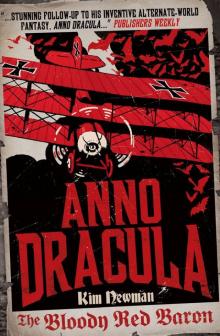 The Bloody Red Baron
The Bloody Red Baron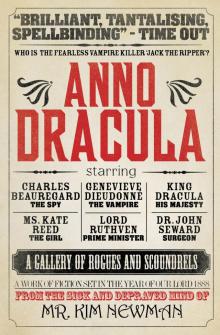 Anno Dracula
Anno Dracula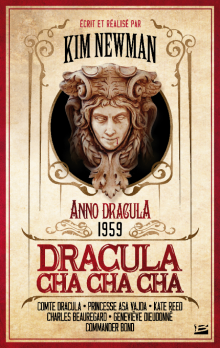 Dracula Cha Cha Cha
Dracula Cha Cha Cha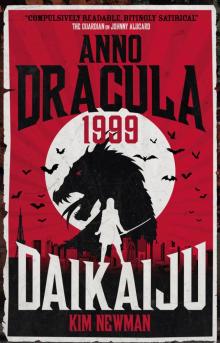 Anno Dracula 1999
Anno Dracula 1999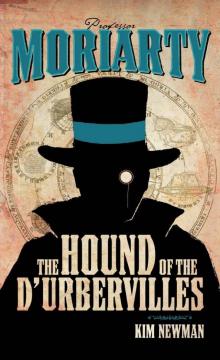 Moriarty: The Hound of the D'Urbervilles
Moriarty: The Hound of the D'Urbervilles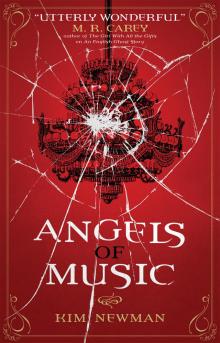 Angels of Music
Angels of Music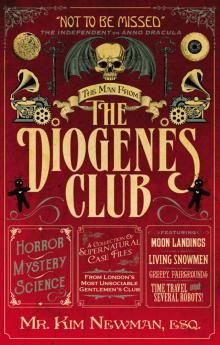 The Man From the Diogenes Club
The Man From the Diogenes Club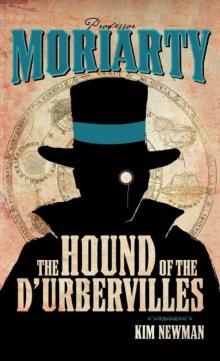 Professor Moriarty: The Hound Of The D’urbervilles
Professor Moriarty: The Hound Of The D’urbervilles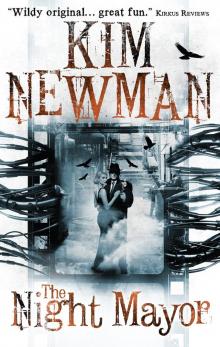 The Night Mayor
The Night Mayor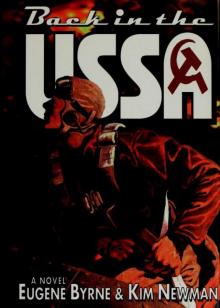 Back in the USSA
Back in the USSA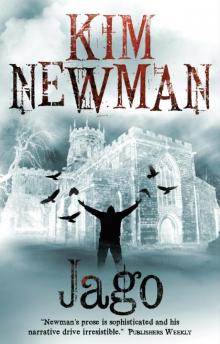 Jago
Jago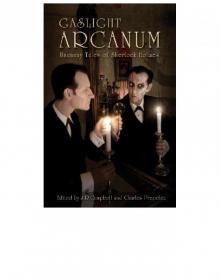 Gaslight Arcanum: Uncanny Tales of Sherlock Holmes
Gaslight Arcanum: Uncanny Tales of Sherlock Holmes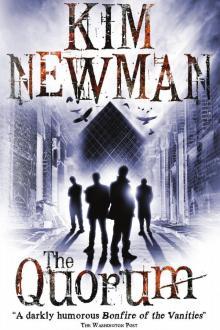 The Quorum
The Quorum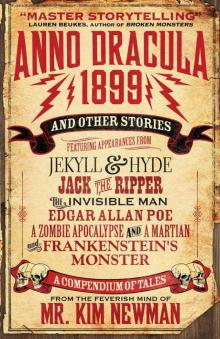 Anno Dracula 1899 and Other Stories
Anno Dracula 1899 and Other Stories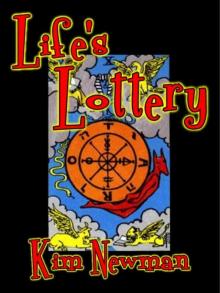 Life's Lottery
Life's Lottery The Secrets of Drearcliff Grange School
The Secrets of Drearcliff Grange School Anno Dracula ad-1
Anno Dracula ad-1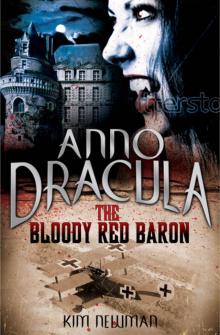 The Bloody Red Baron: 1918 ad-2
The Bloody Red Baron: 1918 ad-2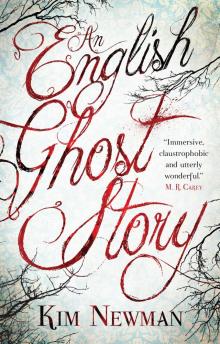 An English Ghost Story
An English Ghost Story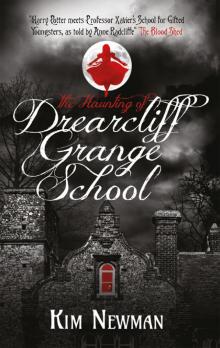 The Haunting of Drearcliff Grange School
The Haunting of Drearcliff Grange School The Other Side of Midnight
The Other Side of Midnight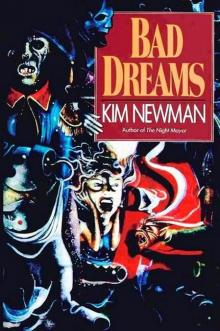 Bad Dreams
Bad Dreams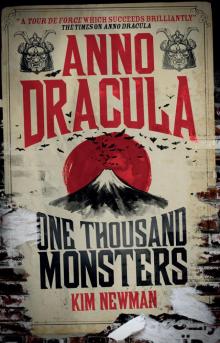 Anno Dracula--One Thousand Monsters
Anno Dracula--One Thousand Monsters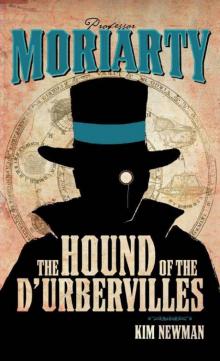 The Hound Of The D’urbervilles
The Hound Of The D’urbervilles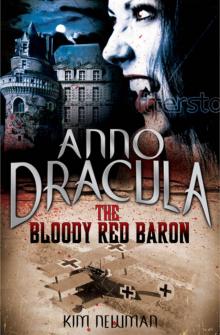 The Bloody Red Baron: Anno Dracula 1918
The Bloody Red Baron: Anno Dracula 1918